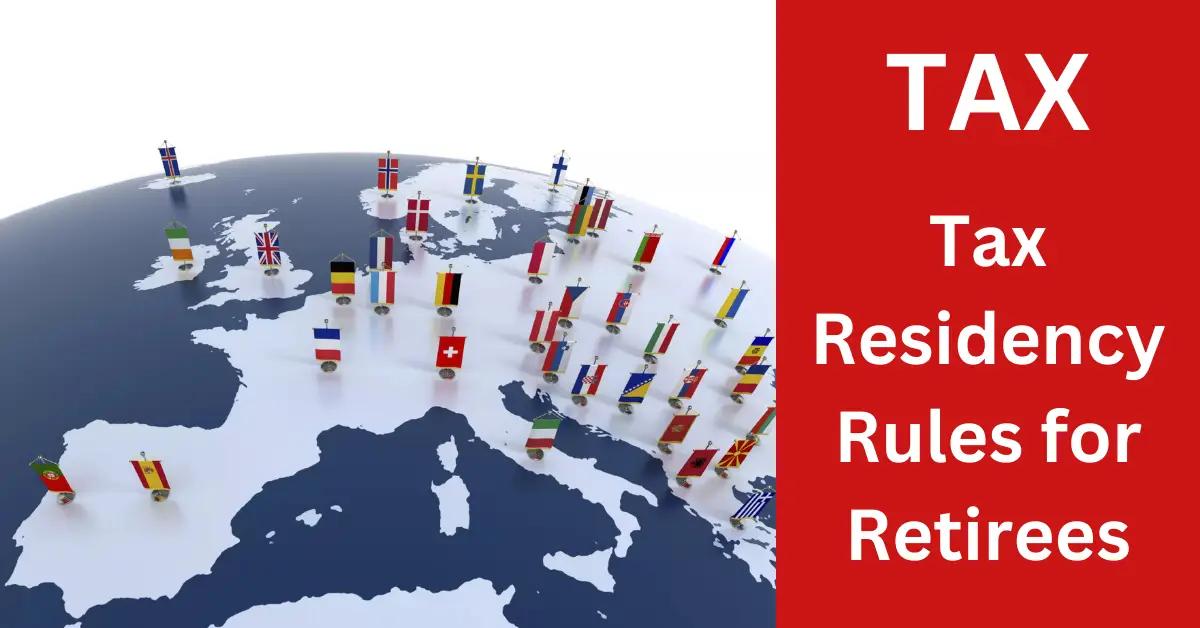TL;DR:
- Tax residency determines where you owe taxes, influenced by physical presence and connection to a state.
- IRS uses the Substantial Presence Test; 183 days in 3 years makes you a tax resident.
- State residency depends on factors like home location, driver’s license, and bank accounts; rules vary by state.
- Retirees may face dual residency, risking double taxation.
- International obligations require reporting worldwide income; tax treaties can prevent double taxation.
- Pensions abroad are taxed based on local laws; age doesn’t necessarily exempt from tax.
- Property ownership overseas involves local taxes and potential capital gains tax.
- Strategies include timing moves for tax efficiency, exploiting tax treaties, and understanding cost of living abroad for successful international relocation.
- Professional advice is recommended for navigating complex tax laws.
Retirement is your chance to explore the world, but navigating tax residency can be tricky. As you plan your new life abroad, understanding tax rules is crucial. The IRS has specific residency rules that can impact your retirement income. State residency can also affect your taxes. This guide on tax residency for retirees will help you make informed choices, ensuring a stress-free journey. Let's dive in!
How is tax residency determined for retirees?
Tax residency can be tricky, especially for retirees. It's key to know your tax residency because it affects your taxes. You may think tax residency means where you live, but that's not all it involves. Tax residency is about where you owe taxes, and this can be different from your home.
To figure out tax residency with the IRS, you need to look at the Substantial Presence Test. So, what determines residency for IRS? If you spend 183 days in the U.S. over three years, you're likely a tax resident. You need to count the days you spend in the U.S. each year. It means more than just living there for a bit.
State tax residency is separate. How to determine state residency for tax purposes? Usually, it depends on where you live most of the time. Check if you have a home, driver's license, or bank account there. Each state has different rules. Some states care about where your primary home is, while others look at where you vote.
Tax residency is crucial for retirees because it changes your tax obligations. If you're seen as a resident in more than one place, you might pay taxes twice. Usually, taxes go to the state where you have your main home. Retirees need to think carefully about where they place their primary living arrangements.
Now, let's address a common question. What is the rule for tax residency in the U.S.? It involves having a permanent home and the Substantial Presence Test. It’s important to understand words like "residency" and "domicile." Your residency is where you live now. Domicile is your permanent home. To avoid confusion, be clear on where you legally live and owe taxes. This understanding is vital for financial peace in retirement.
Can retirees choose their tax residency?
Yes, retirees can often choose their tax residency, but it involves complex rules. Choosing your tax residency depends on various factors such as physical presence and connections to a state. To simplify, it's where you spend the most time and have notable ties like family and property.
Factors affecting the choice of tax residency include the presence in another state and personal connections. Living in one state while claiming residency in another involves distinct legal hurdles.
Pros and cons of dual residency arise if you have ties in multiple places. It offers flexibility but can lead to complex tax filings and possible double taxation.
Impact of family commitments on tax residency decisions is vital. Close family ties may bind you to a state, making a change of residency harder. Family commitments can weigh heavily when deciding your tax grounds, especially in balancing tax residency with family responsibilities.
You can change tax residency by proving significant moves. This might include spending a lengthy period in the new state, changing your voter registration or driver's license, and having strong social ties there.
Legal considerations for changing domicile or residency involve meeting the state's legal standards. This ensures that your new domicile is valid and recognized both federally and locally. It's crucial to follow these protocols to avoid disputes over your tax obligations.
Understanding residence-based taxation helps in making decisions. Some states have specific taxing rules based on residency. Consult with a tax professional to avoid pitfalls and make informed decisions.
For more detailed information, visit resources on state residency rules. It's best to prepare and gather evidence early to ensure a smoother process when adjusting your tax residency.
What are the international tax obligations for retirees?
When you retire abroad, staying on top of international tax obligations is crucial. You must comply with the tax laws in your new country and the country you came from. But are all U.S. citizens tax residents? Simply living outside the U.S. doesn't end your tax obligations. All U.S. citizens must report worldwide income. This rule applies even if you move after age 65.
Double taxation can loom like a dark cloud over expatriate retirees. This means two countries tax the same income. How can you avoid it? You might benefit from international tax treaties. These treaties help by offering credits or deductions. Most countries have treaties with each other. You should understand these to avoid the double tax hit.
While navigating tax liabilities abroad, consider expatriate tax relief measures. Some countries provide special rules for retirees. These can include lower tax rates or exemptions on certain incomes. By exploring these, you can reduce your tax burden effectively. You also need to adopt cross-border compliance strategies. This ensures you adhere to both country's tax regulations.
Filing taxes as a retiree living overseas is challenging. So how do you handle it? First, use tools like the IRS’s Foreign Earned Income Exclusion. Next, take advantage of the Foreign Tax Credit. This credit helps if you've paid foreign taxes. Moreover, seeking guidance from experts in expatriate taxes is smart.
Understanding these international tax complexities not only secures your financial health but also keeps you compliant with global laws. Proper planning and strategic management of your taxes will aid immensely in your retirement journey abroad. Is your understanding of international tax obligations clear? Then, you’re on the right path to financial stability during your golden years overseas.
How are retiree pensions taxed overseas?
Understanding how pensions are taxed abroad is vital for retirees. A common question is: Does a 70-year-old have to pay taxes on social security? Yes, you might pay taxes. The rules depend on the country where you live. Some nations tax social security; others do not. Each country has its own international pension tax laws.
Taxation on Foreign Pensions and Social Security
When it comes to your pension, taxes vary based on the country. In some places, pensions are taxed similarly to local income. In others, they enjoy reduced tax rates. You must check the specific tax laws in your host country.
Double Taxation Agreements on Pensions
No one wants to pay tax twice. Many countries have agreements to prevent double taxation. These agreements let you pay taxes in only one of the two countries. They can help avoid being taxed in both your home and host countries.
Tax Credits and Relief Measures for Retiree Pensions
Some countries offer tax credits or relief measures for retirees. These benefits reduce your taxable income. Check if your host country provides such benefits for foreign retirees.
Pension Transfer Tax Consequences
Moving your pension abroad can lead to tax consequences. Taxes may apply if you transfer your pension from one country's system to another. Assess these costs before transferring funds. It's crucial to understand the implications of moving your pension.
Strategies for Minimizing Taxation on Retirement Income Abroad
Consider strategies like living in low-tax countries. Another option is using international tax treaties to your advantage. If you have dual roots, weigh your options of where to settle. You can also consult a tax expert familiar with expatriate tax law. They can help craft a plan to curb taxes on your overseas income.
What are the tax implications of property ownership for retirees overseas?
Owning property overseas as a retiree brings unique tax challenges. The first concern is tax liabilities associated with foreign property. You may owe property tax in the country where the property is located. This can vary greatly based on local tax laws, which means retirees must do thorough research or consult local advisors.
When you sell property abroad, the capital gains tax may apply. Capital gains tax is the tax on the profit from the sale of an asset, like property, and its rate differs by country. You will likely pay this tax both to the foreign country and potentially to your home country. In some cases, foreign tax credits or deductions might be available to prevent double taxation.
Property tax laws vary widely. Some countries offer tax breaks for senior citizens, whereas others do not. It's important to know your host country's specific rules to avoid unexpected financial burdens.
Now, consider how foreign real estate taxes affect retirees. You should understand not only what taxes are owed but also how they fit into your overall tax plan. Countries may tax property based on its value, location, or use, so get accurate assessments of these factors.
To ease these burdens, retirees should explore strategies to minimize property tax liabilities. One common tactic is taking advantage of tax exemptions or deductions offered in the host country. Another is strategically timing the sale of property to minimize capital gains tax exposure.
In conclusion, understanding and managing these complexities is crucial. You can learn more about capital gains tax implications and strategies for tax liability through further exploration of comprehensive resources or by visiting this detailed source.
What tax strategies should retirees consider when planning for international relocation?
Ever thought about retiring abroad? Financial planning becomes vital when making that choice. It's not just about the beaches and sunsets; it's about smart tax planning. So, what tax strategies should you consider for an international move?
Firstly, consider timing your relocation. Timing affects your tax status both at home and abroad. Many countries use the Substantial Presence Test to determine tax residency. If you spend more than half the year in the U.S., you're likely still seen as a tax resident there. Plan your move to avoid unwanted tax bills.
Next, pre-migration strategies can help you control costs. This means understanding how your income gets taxed in your new home. Some nations may tax your pension differently. Understanding these differences informs your decision on where to settle.
One strategy involves using tax treaties. Treaties between countries can prevent double taxation. These agreements might let you pay tax on income only in one country, not both. Research available treaties to lessen your tax burden.
You also need to think about the cost of living in your new country. Taxes are one part of your expenses, but other costs play a role too. How does property tax compare? Is healthcare affordable? Knowing these costs helps you budget better.
Finally, what about state residency if you keep a U.S. address? States have their own rules, so understand how they determine residency. Rules differ by state and can impact your tax obligations at home.
In summary, smart planning helps you enjoy retirement abroad. Timing your move, using tax treaties, and considering the cost of living all make a difference. Plan wisely for a smoother transition.
Conclusion
Tax residency shapes your retirement's financial picture more than you’d think. We explored its rules, choices, and international obligations. Knowing these helps safeguard your money from double taxation and unnecessary liabilities. Mastering tax laws ensures peace of mind abroad. Choose residency wisely, consider dual options, and stay alert for changes in global tax rules. This awareness can greatly reduce international tax burdens. By understanding taxation nuances, you can enjoy your new life abroad without financial worries. Plan smart, live well, and embrace your global retirement adventure.












